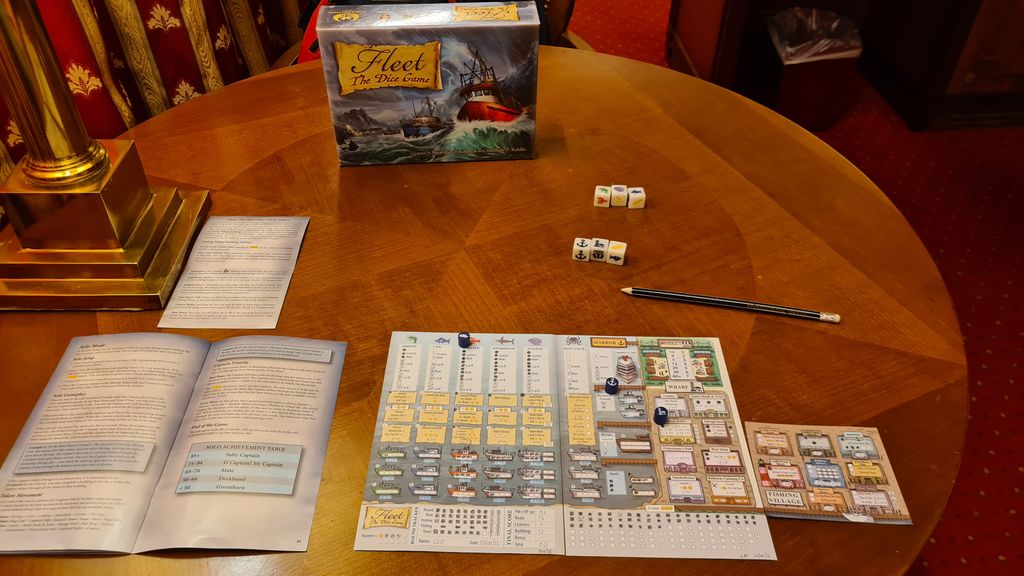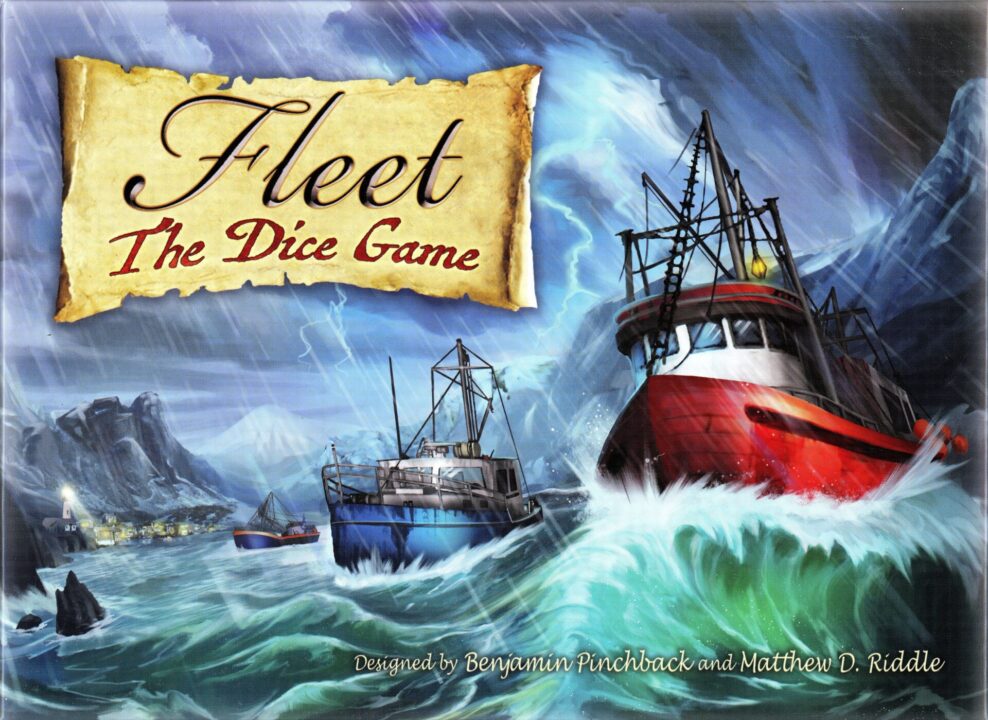Overview
Welcome to the world of strategic fishing with my review of Fleet: The Dice Game. As someone who relishes dissecting game mechanics, this review will cast its net over the intriguing gameplay dynamics of resource management, roll-and-write mechanics, and the engaging player interaction that anchors Fleet: The Dice Game. Let’s dive into what makes this game a possible mainstay in our gaming collections and a delightful challenge for strategy aficionados.
How It Plays
Fleet: The Dice Game takes players through the strategic world of commercial fishing, where allocating resources and rolling dice with earnest rigor make for an absorbing affair. Within this framework, success hinges on how deftly one can navigate the sea’s bounty. Let’s chart these waters.
Setting up
To begin, each player is given a score sheet and a pen. Components such as the fleet and license cards, dice, and boats are set up in the middle of the table, ensuring that everything is within reach for all sailors—erm, players.
Gameplay
Players take turns rolling dice, then choosing which to keep to unlock licenses, launch boats, and harvest fish. Strategic choices must be weighed each round, balancing immediate needs and long-term planning, akin to our own life decisions but with less existential dread.
Winning the game
After the final round, victory points are tallied, factoring in the fleet’s size, filled licenses, and bustling fish markets. The sailor with the most points can proudly shout, ‘I’m the captain now!’ as they emerge the maritime mogul of the high seas.
Want to know more? Read our extensive strategy guide for Fleet: The Dice Game.
The Tides of Strategy in Resource Management
Critical to any satisfying gaming session is the resource management mechanics that underpin the strategy and planning phases. In Fleet: The Dice Game, the pursuit of maritime mastery hinges on judicious allocation of your resources—fish, licenses, and boats—which immerse you deeper into the thematic currents of a thriving fishing industry.
Allocation & Adaptation
During gameplay, I recall moments of intense deliberation, where allocating my crew across my burgeoning fleet required an elegance of decision-making I hadn’t anticipated. The game necessitates a seamless pivot from one strategy to another in response to the capricious whims of the dice roll.
Dice Contingencies
The toss of the dice doesn’t just determine action; it steers the course of strategy in this ocean of competition. My personal voyage across the game’s strategic sea often made me weigh the present pay-off against future gains, engendering a battle of wits between long-term and immediate rewards.
Sailing forward, dip your oars into the intricate waters of Roll-and-Write Gameplay, the next segment of our review voyage where the pen may indeed be mightier than the swordfish.

Charting a Voyage on Paper
In the landscape of roll-and-write games, Fleet: The Dice Game charts a course toward excellence, captivating me with its intriguing gameplay. There’s something deeply satisfying about marking off a boat or license on your sheet, an action dictated by the luck of the dice yet still within your strategic control. Yet, despite my plans, the dice roll can prompt a crucial pivot, a test of my adaptability as fleet admiral.
Strategy and Serendipity
The game expertly balances the tension between strategy and the randomness introduced by its dice-driven gameplay. With each session at the helm, my understanding of the game’s oceanic depths grows, allowing me to harness the unpredictability in my favor. Friends and I chuckle as what seemed like a perfect strategy is capsized by a surprising roll, pushing us to navigate with acute cheekinopgeumtroopsmp.
Capturing the Dice’s Bounty
Fleet draws you into a mini-universe where careful planning usually triumphs but occasionally succumbs to the will of the dice. In my Fleet voyages, I’ve found even the most seaworthy tactics can be dashed upon the rocks by bad rolls, ensuring that no two games ever sail the same waters. The lesson is clear: adapt or watch your fleet flounder. Now, let’s steer course to another crucial ingredient that keeps the waters of gameplay interesting: Player Interaction. Our next port of call awaits!
Captivating Competition on the High Seas
In Fleet: The Dice Game, the interaction between players is skillfully woven into the very fabric of the game. Competitive Bidding serves as my first noteworthy encounter, which always sparks lively banter around my table. Jockeying for those valuable licenses that fit our strategies fosters both rivalry and camaraderie.
The Tense Auction House
Moreover, Fleet cleverly pits players against each other in a dynamic fish market. With a smirk, I recall bluffs and calculated risk-taking that have led to both triumphs and playful grudges,
Shared Seas but Not Shared Goals
Away from bidding, every dice roll can benefit opponents, urging you to stay sharp. This shared-resources twist perpetually tethers us together and injects a deeper layer of decision-making.
Conclusively, the intertwining of individual tactics and group dynamics in Fleet reinforces its allure for me. Hence, it sails right into my harbor of recommended games.
Conclusion
Concluding this review of Fleet: The Dice Game, I want to emphasize the delightful synergy of mechanics that this game presents. It’s a solid addition to the roll-and-write genre, offering enough strategic depth to keep you hooked for several playthroughs. The resource management is intuitive yet deep, gameplay embodies the charm and unpredictability synonymous with dice games, and the rich player interaction keeps the table buzzing with excitement and competition. Whether it’s the clever use of fleet and license combinations, or the shared rush as a coveted fish crate is snagged from right under your nose, Fleet: The Dice Game ensures a consistently engaging experience. It carves a fishy niche in a crowding sea of roll-and-writes, making it easy to recommend to casual game nights and serious gaming sessions alike.


